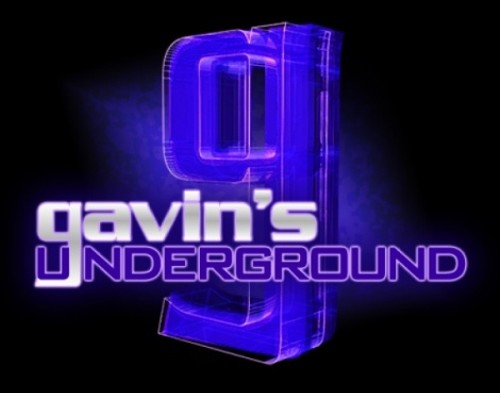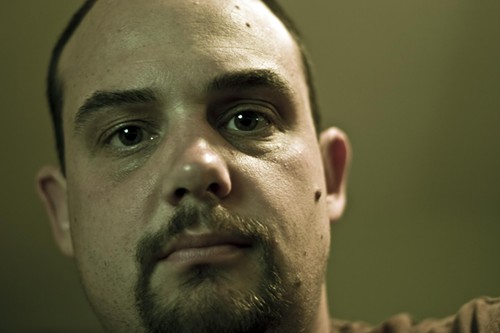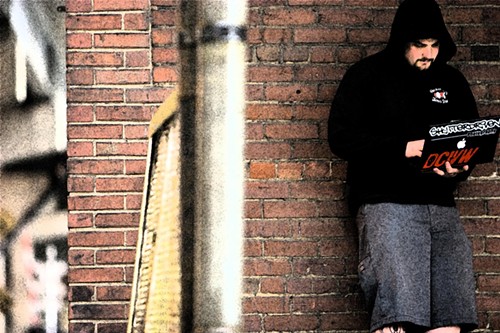Thursday, July 16, 2009
Travis Ogden
Posted By Gavin Sheehan on July 16, 2009, 9:37 AM
When
you think of computers today and the freedom of online capabilities,
we're goddamn spoiled! The idea that a simple tool like your browser
can put the most of the world at your doorstep has become a day-to-day norm between taking a shower and getting lunch. But just two
decades ago owning a system, let alone getting online, was a feat to
behold. And in the heyday of the BBS came a series of programmers
later to be dubbed... hackers. The name Travis Ogden might not ring a
bell, but his handle “Gen” is recognized as one of the pioneering
names in hacking circles, earning early credibility that got him both
infamy and a government gig, not to mention a longterm career in
programming. I got to chat with the man himself about his life in
hacking (which admittedly, this interview only scratches the surface
of it all) and other thoughts on a number of other topics.
Travis
Ogden ---
---
Gavin:
Hey Travis. First off, tell us a little bit about yourself.
Travis:
Always a hard question to answer, where to start, where to end and my
interests are so varied. As of late I've been working pretty long
hours at my job, outside of that I have a side job where I am doing
consulting for legal counsel in cases dealing with technology that
needs analysis, explanation etc. In my spare time I've got a couple
motorcycles that I enjoy turning a wrench on (86' Honda Nighthawk and
a 2001 Triumph Tiger). I'm also into older watercooled VW's and have
one that's a racecar. When I get the travel bug which I often do, I
hit the road in my FJ60 Toyota Landcruiser and see somewhere I
haven't seen before. Last time I did this I drove up to Alaska and
"drove" the Stampede Trail talked about in the movie/book
"Into the Wild". As you can see, I'm all over the
place.
Gavin: Former Utah resident as a lad, how was
your time here as a kid?
Travis: It was great! I look
back at those years with very fond memories. I spent many years in
Richfield, where my brother was born, then in Price. The red hills of
Richfield were a fantastic place to explore and I did so with the
boyscouts. I remember the Arches National Park, the dinosaurs in
Vernal etc. This is also the place I got started with phreaking
thanks to my cousin.
Gavin:
Speaking of phreaking, around that time is when you started learning
about early techniques. What kind of stuff did you learn?
Travis:
When I was growing up in Utah, I really didn't know much of anything
about computers, only whispers of an elusive and rare knowledge that
would allow people to make calls without having to actually pay for
them. This was really my first glimpse that there was something
beyond the norm, a source for adventure, to do something others
couldn't do - an opportunity to learn. I could say that it was
actually phone phreaking that got me into computers because computers
provided a way to take phreaking to a newer and more in depth
level.
Gavin: How did you utilize that stuff when you
moved to Alaska?
Travis: If Utah was the foundation in
what I was learning then Alaska is assuredly the house. What I
discovered in Utah really began the momentum of my thirst for
knowledge and my desire to do something different. Alaska is really
where everything gelled, my desire to get people together to form a
think tank, to take things to a newer more advanced level as far as
my own skills and knowledge and to become a part and even help drive
this thing called "computer security".
Gavin: When did you start chatting with the people from The Cult Of The Dead Cow, and what was that like contacting another BBS back then?
Travis: I believe it was during the late 80's and on occasion after that including at Defcon (before I quit going years ago). Back then the communication was still with modem and with modems the speeds greatly varied and with the varying speed came the different levels of frustration! There were other phreakers in every state but they were sort of cut off from the other states/great areas of phreakers because of the lack of ability to "reach out and touch someone" like we do now with the internet/web. Using techniques picked up by phreaking (placing long distance calls without having to actually pay for them) we were able to connect out of state BBSs which started the influx of new data and ideas. These old BBSs had some simple games, a crude email system and a file transfer area you could engage in but only if you gave more then you took. I think it was really that need to keep your transfer ratio up that caused us in those days to spread out, contact more BBSs and collect data as ravenously as we did. Even after that once we all moved to the internet - it was that as a basis that drove much of our desire to trade, move data and engage other like minded individuals.
Gavin: What drew your interest toward computer techniques and hacking?
Travis: Really the shift in interest was due to the end of the local phreaking for me. I was noticing friends and people I interfaced with on BBSs disappearing because they were getting busted for those very techniques we'd learned that connected us initially. Take away that which quenches your thirst and you are again left thirsty. In this case knowledge and the quest for it was our thirst. Once phreaking was taken away I and many like me were left with the computers we'd used to pursue phreaking desires. With computers being what was left, we had a new foundation on which to build upon and a new direction to direct our attention.

Gavin: How did you get into the University Of Fairbanks and start up Genocide2600 up there?
Travis: Easy. I, like I think most people of graduating high school age encounter, I wanted more money and to do that I felt like I needed to expand my horizons with college. I decided I'd capitalize on my music background which I felt was more legit then my time spent with computers and I'd become a music teacher. Once at the college I was connected socially with some very brilliant people who were at their core early computer nerds. The meeting of these individuals and the opportunity that presented itself with an abundant technology cornucopia - the stage was really set.
Gavin: What were the kind of things you guys were doing during this period, and how was it that no one caught on to what you were doing for so long?
Travis: We were familiarizing ourselves with technology, new operating systems, new programs and how to exploit them - giving us control of the systems on which they ran. Since there were a few of us, each because of their own interest was delving into different avenues of technology and were brining that newly found data back to the core group and present it. We were harvesting data, bringing back tools and understanding back to the group and serving to strengthen that group and as being part of the group - strengthening ourselves. In this model there really isn't a weak point, the more time that is spent the stronger the group grows. We learned faster than people that were attending the computer science classes that were going on around us. On the rare occasion that a faculty member would drop by they would either walk by while we were giving a report on some new version of Linux or talking about the ins and outs of SMTP. Much of which is very boring to those who do not "talk the talk".

Gavin: Probably the milestone moment for the group was the hack on a security software company. Can you tell us the backstory to it and what happened?
Travis: I honestly can't tell that story personally, just yet. I can say that we were and specifically I was investigated as being the one(s) who perpetrated this successful attack. It was stated that the security software that was held on this high profile server that was penetrated was found on our groups underground (hidden in a local college computer lab) server but at that stage, the software had made it's way out to the masses and people were pulling it down and then posting it to their own underground sites or "Warez" sites all over. No group member was ever formally charged for the penetration of this server.
Gavin: Did they ever catch who did it, and what ended up happening to both you and the group?
Travis: They did not. Now the issue is nearly entirely buried but even then it was only a rumor as to who perpetrated the attack and disseminated the stolen tools.
Gavin: Eventually you went on to work for Microsoft in the mid-90's. What was that experience like for you?
Travis: Hah, wow, thanks for bringing up such a blemish to whatever reputation I may have! I wish I could say that all my experience was with Unix based operating systems, alas, I did work for the evil empire once. I worked for a company that was under contract for Microsoft and to tell you the truth, I really didn't enjoy it. Once the company I worked for gained this contract they went through several changes to make us more in lock step with Microsoft and as a result changed interoffice policies on behavior, dress and even speech. As it turns out, I don't exactly thrive in such a constrained environment so my work there was short lived.
Gavin: At one point you were in a group of hackers called EHAP, I hope I have that name right, who were fighting child pornographers. How did that group get started?
Travis: EHAP, correct, Ethical Hackers Against Pedophilia. As a group the Genocide2600 group had been conducting our own semi-crude attacks on people running and producing child pornogrphy for some time but in truth we lacked a few skills that would have made us entirely effective. Also, simply attacking and kicking these people offline only served in making them pop up in an alternate location - we needed to find a way to make the banishment stick. EHAP's original idea came about by someone named RSnake who ran a sort of online BBS at the time, who's name escapes me right now. He approached the remaining members of the original collective (for lack of a better term) of hackers who competed and at times fought over posting new security data, hacks and software procured at their respective sites of which there were only a few of us left to start this group. Nearly all of us agreed. This group in addition to the Genocide2600 group filled in all the gaps and left us with a very well rounded team.

Gavin: How did the system work from you finding them to the official arrest?
Travis: Essentially we'd work with law enforcement, be it local or something like customs agents, to gather intelligence on people that were under investigation and then turn over that intelligence for prosecution of the individuals. As it was in those days we tracked plenty of "runners" of the information and that was a good thing - but the main people we were after were the actual producers. Those at the origin of some of the most hurtful and damaging material I've ever seen in my entire life.
Gavin: What ended up happening with the group and caused it to end?
Travis: The end of the group came when we essentially became to hot and were to much in the public eye. The actual event where this occurred was where we were gathering data on someone who was suspected of being a producer and we'd turned over data to the FBI since the person was transmitting data over state lines. We believe the FBI had communicated with a local law enforcement group who had jurisdiction in the area where the bust was to go down. Regardless as to who contacted who, someone tipped off the person that agents were coming for them and instead of turn themselves in, they decided to take their own life. As it turns out, this person was a member of their own family, with children, and a "respected" member of the community. Once this individual had taken their life, the local media where this took place somehow heard that hackers had driven this individual to take their life and made us out to be terrors of the ether. Once we were now "hot" in the eye of public AND painted in such a light no law enforcement group would work with us anymore. Though the group ended in such a torn and twisted way, it's important to realize that much good came out of it even aside from the cases we were working on up to and during the point when it all ended. Because of this work we'd done and been successful at doing law enforcement agencies realized there was a gap that needed filled and themselves initiated internal groups designed to combat children being taken advantage of online. Several spin off groups were initiated at this time as well.

Gavin: What's the story behind you ending up working for the FBI?
Travis: Haha, well, technically I didn't work for the FBI. I was working instead for the government and specifically on two AirForce bases as an individual contractor. Everyone who is familiar with the story of the Genocide2600 group thinks I went to work for the feds. I really didn't. I was under investigation on suspicion of posting serial numbers for some communication software and was in the midst of fighting that battle when I received a message which suggested I call my voice mail. On my voice mail was a message from someone who suggested strongly I call them. I did call and found out that I was speaking to an FBI agent and that he wanted to meet with me. I agreed and hung up the phone and pretty much lost it. I was pretty well dead sure I was going away never to be seen again which to me was a pretty valid concern seeing as similar fates had fallen upon other comrades. I called an emergency meeting of the Oregon chapter of the Genocide2600 group, went over a sort of last will and testament and then I called and setup a time for the meeting. The gentleman I spoke to on the phone met me with a few other individuals and they took me to a local burger joint to talk (Burgerville for those who are familiar with Oregon). We really didn't speak much till we sat down and then they started with a surprisingly expected verbal pressure technique where they try and state that they "know what you did" trying to draw out information to use against you. I really didn't say much, I guess I probably didn't have to, I was already scared to death. I really don't remember much of the conversation anymore partially due to the fact that it was so long ago but also partially due to the fact that I wasn't really listening. I was more in shock that I was talking to feds and I was wondering if this is where I got taken away never to see my friends again. What I did get out of the conversation was simple, the feds I had talked to suggested that I had talents that were in demand and that in a manner of speaking my personal freedom was in jeopardy if I didn't decide to use my talents toward the greater good. So that was it, I was offered an opportunity to essentially atone for my sins through a four year contract. Really, if it's that easy, who wouldn't take that sort of deal? Especially when it means that you could fill in the hole you'd been digging for the past few years called "your future".
Gavin: Without going into great detail, what was the kind of work you were doing during this time?
Travis: Computer security. ...Haha!

Gavin: When the four years with the government ended why did you decide to quit and what did you go do after?
Travis: Well, my contract was up and my marriage at the time was crumbling apart at almost exactly the same time. Seemed like I was being told something by a higher power. Also, when my contract ended, I was in South Dakota. Now, South Dakota has it's pretty spots but man, you really don't want to live there if you can help it! Haha. I was very fortunate to have two close friends who would do anything for me come out and essentially rescue me, bringing me back to Portland. One of my buddies from high school and a member of the group.
Gavin: How did you come into the unnameable job you're currently at?
Travis: This one is still a bit of a mystery to even me. I honestly do not remember applying for it. I was called out of the blue to come in and interview, my security clearance and experience I gained while working for the military really legitimized me as a security professional and I really owe my entire career to that.
Gavin: I know you can't go into specific details over it, but what are you doing these days?
Travis: I'm doing what I've always been done. Though, over the past eight years I've been working on "big iron" or Super Computers mostly in my primary job. I don't want to really say more then that. As a second job I've been working as an technology expert in legal cases like I explained earlier and am currently working a case in California.

Gavin: Outside your job, what other freelance work do you do? And do you still keep up on your hacking skills or have you put that part of your life to rest?
Travis: I'd say that "hacking skills" transcend the limits of being used to create and control software tools that are designed to take advantage of existing technology. Hacking skills to me are a change to how one thinks, the gained ability to problem solve in unconventional ways and come up with a solution that no one else has thought of. With that in mind, I try and use hacking skills in all things I do. Work every day, wrenching on the cars on the weekend, when there is an emergency, in relationships etc. Once you've adapted that mindset, you can not lay that part of your life to rest as it becomes part of your very self.
Gavin: Is it weird having your experiences written in The Hacker Diaries and getting feedback from people on it?
Travis: It is a little strange. I think the most odd part is that when people reach out to contact me they do so knowing part of my life, knowing me in a sense and I have zero knowledge of them. I suppose you could say I feel like I'm at a disadvantage as a result. But, I really like that I've apparently inspired some people to get into technology deeper then they may have previously and to think outside of the boxes they live their lives in.
Gavin: Let's go a little broader. Whats your take on hacking these days and how far people have come as far as technology and skills?
Travis: It seems that the lines that segregate the various types of hackers have become much more defined, black and obvious. For instance, the difference between the script kiddie and the security professional. There will always be the various script kiddies running scripts they found online with the intent to destroy, like a child who finds a gun and somehow hungers for the pop which follows the pull of the trigger. The biggest difference I see looking back is that now there are far more laws in place to punish those who are destructive and because there are laws there are those who enforce those laws who are VASTLY more savvy then they used to be. Really, the 80's and into the 90's were like wild west as far as law and enforcement goes, but now we've caught up with modern times. The gap between the cops having the same guns and tactics available as the robbers is ever closing. I think because of the laws now in place and the tools now controlled by law enforcement those that would have been "hackers" back in the day are directed to a more constructive end and are more and more becoming security professionals.
Gavin: What's your opinion on Hacktivism and how its played a role online over the years?
Travis: Hactivism is usually defined as being politically motivated hacking which often includes denial of service attacks against political targets as well as defacement of websites and the deployment of malicious software. My personal opinion on Hacktivism is that I don't employ it to get my political beliefs heard. I go down different less destructive paths. But that doesn't mean I don't understand it. When people feel they've been wronged and aren't going to take it anymore they take it upon themselves to make a difference with whatever means they find at arms reach. For some, it's a rock, for some it's a gun and for others it's a keyboard. I know that if my means for being heard were taken from me, I'd reach out my hand and see what I could find to use as a tool as well.
Gavin: What's your take on films like "Hackers" and the Hollwood-look on what you were really doing?
Travis: You know, at first (and for years really) I lambasted the movie "Hackers" as absolutely ridiculous. But then I realized a couple things, when I put myself in the place of the people that made the film - how do you show people any sort of representation of what "we" do that would be interesting? Real hacking often takes place alone, in a dimly lit room, at 2AM, hands jittery from caffeine next to an ash tray full of cigarette butts below a monitor with a few black terminal screens with various colors of text scrolling by. For hours. Not interesting. By anyone, even the tech savvy. So, what the creators of the movie did was make the visual trip of traversing directories, jumping through the system and then looking at files more visually appealing and somewhat understandable to those who would regularly not been able to figure out what was going on in the slightest. If they were to depict what REALLY happens there would have had to be an extended description every few minutes to suggest why he injected this snippet of code etc. The somewhat silly graphical representation that was shown in "Hackers" did that same job instantly. The second thing I realized was that after this movie EVERYONE wanted to be a hacker and EVERYONE was naming themselves "ZeroCool" online. Annoying, yes. But the underlaying change that was happening was that these people were being inspired to learn - venture out of their zone of safety and were being filled full of a hunger for discovery. So, "Hackers", though somewhat a silly movie loosely based on a real group of people is a win in my book.
Gavin: From a tech standpoint, where do you see computer technology going over the next five years or so?
Travis: I think a more fair question would be, where do I NOT see it going. Computer technology seems to be in every facet of our lives even now. We have pets that have RFID chips in them that document their owner and shot records. This was an alien thought only a handful of years ago. So, the safest answer I can come up with is that computer technology will go wherever we think it'd be alien, strange and wrong to go in the future.
Gavin: I know its been brought up before, but have you given any thought to writing a book on your experiences?
Travis: I have and I likely will, once of course, certain statute of limitations are over.
On Topic...
-
Film Reviews: New Releases for April 19
The Ministry of Ungentlemanly Warfare, Abigail, The Beast, Hard Miles, Sasquatch Sunset and more
- Apr 19, 2024
-
Film Reviews: New Releases for April 12
Civil War, Escape from Germany, Coup de Chance, Hundreds of Beavers, La Chimera, Sting
- Apr 11, 2024
-
Film Reviews: New Releases for April 5
Monkey Man, The First Omen, Wicked Little Letters, Girls State, Scoop, Exhuma
- Apr 4, 2024
- More Gavin's Underground » More Culture »
More by Gavin Sheehan
-
Gavin's Underground: End Of An Era
Nine and a half years of local entertainment blogging comes to an end.
- May 26, 2017
-
Torris Fairley
A quick interview with the up-and-coming SLC-based comedian.
- May 25, 2017
-
Cirque Asylum
A look into the dance school teaching unique forms of aerial arts.
- May 24, 2017
- More »










